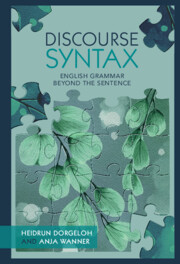5 - Special Endings
from Part II - Grammar in Discourse
Published online by Cambridge University Press: 20 October 2022
Summary
Chapter 5 of Discourse Syntax (Special Endings) deals with two constructions that place sentence elements in the final, end-focus position. Discussing the extraposition of subject clauses (it-extraposition) and the cleft construction (it-clefting), the chapter shows that both constructions serve the distribution of given before new information in the sentence and the placement of complex material at the end of the sentence (Principle of End-Weight). It also shows that alternative constructions (non-extraposition) as well as discourse types and registers play a role in how these non-canonical constructions are used and that there are differences between speech and writing as well as other discourse types and modes. The chapter also discusses the presentation and visualization of quantitative corpus-linguistic evidence and presents strategies for dealing with absolute, normalized, and proportional frequencies gained from natural language corpora.
Keywords
- Type
- Chapter
- Information
- Discourse SyntaxEnglish Grammar Beyond the Sentence, pp. 130 - 158Publisher: Cambridge University PressPrint publication year: 2022

